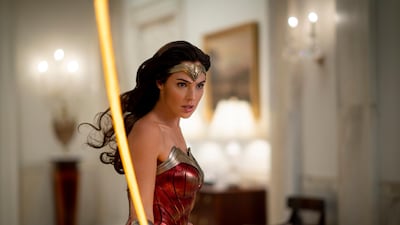Set in the eclectic Eighties, Wonder Woman 1984 should have been a high-octane, nostalgic adventure filled with the loud clothing, neon lights and glassy synths of the era. And maybe a few perms along the way.
The film, starring Gal Gadot in the titular role, certainly delivered some of what audiences were expecting. However, it has also been accused of including some stereotypes that Hollywood had appeared to move on from in recent years.
With the film partly set in Egypt, many viewers have taken to social media to highlight some of the film’s problematic depictions of the country and its people.
Midway through the film, which was released in the UAE on December 17 and in the US on Christmas Day, the film’s antagonist Maxwell Lord (Pedro Pascal) travels to Egypt where he meets the "new king of crude”, Emir Said bin Abydos (Amr Waked), hoping to gain ownership of his oil fields.
As the two converse, Lord asks Emir Said what he wishes for, promising to make it come true.
“I wish for things one cannot attain,” Bin Abydos says. “All of my land to be returned. My ancestral realm. The Bialyian Dynasty. And for all the heathens who dare trod upon it to be kept out forever, so that its glory may be renewed.”
"When they said Wonder Woman 1984, I thought they meant like neon colours and synths, but they meant horrifying Middle Eastern stereotypes," Twitter user Josh Lewis wrote.
As presented in the film, the fictional Emir Said seems to rule oil-rich lands near Cairo. In fact, there was no monarch in Egypt at the time. King Fuad, the last king of Egypt, was deposed in the mid-1950s and during the time the film was set, Hosni Mubarak had already taken over the presidency for three years following the assassination of his predecessor, Anwar Sadat.
“Is it even a spoiler to try to make sense of an Egyptian dude dressed like an Orientalist painting who wishes to rule his ancestral homeland in Cairo and expel all the Arabs and keep them out with a magic security wall,” Marc Lynch, a professor of political science and international affairs at George Washington University, wrote on his Twitter.
The film also takes liberties with its portrayal of 1980s Egypt, with more than a few out-of-time features.
“The movie’s idea of what things were like then is incredible,” user hollyboughs wrote, adding that Bin Abydos seems like “he’s from the 1500s”.
Another plot-point that viewers found troublesome is when, during a high-speed vehicle chase, Wonder Woman – with the help of some CGI – swoops in and saves two Egyptian children from being run over by a convoy before advising them in Arabic to stay clear of the road.
"WW84 is that type of white feminist movie where a white man from Jim Crow-era segregation is the best man humanity has ever known, but the Arab men are fanatic bigots desiring a border wall," journalist Ahmed Ali Akbar posted on Twitter.
The writer also referenced a scene in which one man hopes for nuclear weapons when asked to share his greatest wish.
"I’m not commenting on the rest of the writing of the movie, just specifically the way race / racist tropes were deployed with regards to the men of colour in the film," Akbar added. "I had other issues with the movie, but I think the racial tropes had zero need to be in the film."
However, it wasn’t just the film’s portrayal of Arabs and Egyptians that prompted eye rolls; critics slammed the film for its cumbersome screenwriting and overstuffed narrative.
"Wonder Woman 1984 would have been a better movie if Wonder Woman weren't in it," Christopher S Rose, a social historian of medicine focusing on the 19th and 20th-century Middle East, wrote on Twitter.
"Make Kristen Wiig the heroine instead. Shorter, more interesting, no Egypt sub-plot, more Kristen Wiig."


